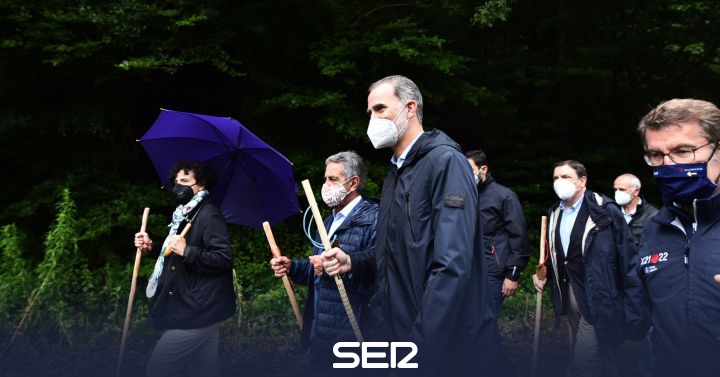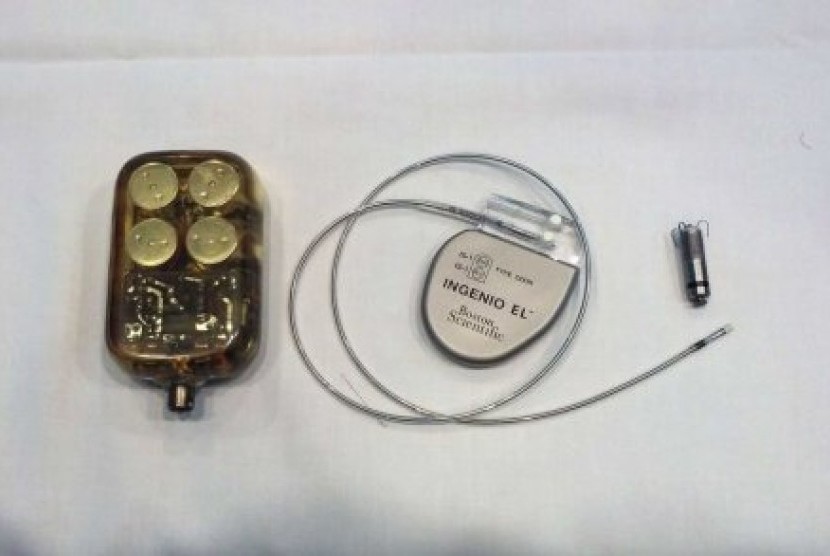The presidents of the autonomous communities through which the Camino de Santiago passes have highlighted the cultural and heritage value that the Jacobean route represents, as well as its ability to contribute to unity and coexistence.
Representatives of the communities through which the French Way and the Coastal Way pass (Basque Country, Galicia, Asturias, Cantabria, La Rioja, Aragon, Castilla y León and Navarra) have joined this Monday in Roncesvalles (Navarra) to an act of commemoration of the Jacobean Year in which the kings, Don Felipe and Doña Letizia have participated.
The program began at around 12 noon in Alto de Ibañeta with a greeting from the kings to the regional presidents and the rest of the authorities (the presidents of the Basque Country and Asturias did not attend, but representatives of their respective governments did). Subsequently, they have made a walking tour of the section of the Camino de Santiago, of around a kilometer and a half, to the urban complex of Roncesvalles. Once there, in the church of Santa María the commemorative act of the beginning of the Jacobean Year 2021-2022 has been celebrated.
CHIVITE: “IT IS CULTURE, HERITAGE AND TRADITION”
The first to intervene was the President of the Government of Navarra, María Chivite, who highlighted the value of the Camino de Santiago for “inclusive coexistence” and stressed that the Camino “is culture, heritage, tradition, an asset for the economy and tourism, a space of experiences, experiences, introspection and spirituality “. “The Camino de Santiago, those roads that converge on it and make it a meeting place, unites us,” he said.
Chivite has stated that “this place where we are today connects us with Europe, with the rest of the communities in Spain, it is a point of reference for those who, from all corners of the world, come to our country to live this unique experience”. “Our commitment to coexistence, to move forward together, has on the Camino de Santiago the best symbolic representation of that way of understanding society and our country,” he insisted, to advocate “putting in value what unites us, just like the path unites, and what makes us stronger “.
NÚÑEZ FEIJÓO: EL CAMINO, “THE OLDEST SOCIAL NETWORK”
Along the same lines, the president of the Xunta de Galicia, Alberto Núñez Feijóo, has affirmed that the Camino de Santiago is “the social network par excellence, the oldest, most inclusive social network, and the one that has lasted the longest. of the centuries “. “The Camino is not only a prodigy in its origin, but also for its ability to overcome times and to overcome distances. If the roads are the first human intervention on nature, the Jacobean route was the first reminder that the deepest instinct of a human being is to live together, it is to share, in short, it is to walk together “, he stressed.
Thus, he has ensured that “both our Communities, such as common Spain, and the Europe of which we are part are formed thanks to the roads.” “Without that relationship, shared feelings would not have been forged and without those feelings, the community, the nation or the European project would not have had solid and lasting support,” he said.
“The Way again emits from Roncesvalles to Compostela a message for the future. It tells us that destiny is written by free men and women whose strength depends on unity,” he said, adding that the presence in the act of the Kings of Spain “symbolizes the unity that is embodied in the Camino and that we would like to see also reflected in the events of our country.”
CASTILLA Y LEÓN: “WHAT IS DIFFERENT ENRICHES US”
In the same sense, the president of the Junta de Castilla y León, Alfonso Fernández Mañueco, stressed that “the Way refines our soul and reinforces our transcendent sense, but also contributes to the brotherhood of people and peoples, teaching that what is different does not it separates, but enriches us. “
Fernández Mañueco has affirmed that this is “something that we have very present in Castilla y León, which hosts the longest route of all the routes that go to Compostela, more than 2,300 kilometers in its multiple paths of Jacobean spirit”. “They are paths that are shown as a source of faith and as a source of the future around the resources that can attract population, wealth and also alternatives for the territory,” he highlighted.
ARAGÓN: “ROAD AGAINST BORDERS”
The president of Aragon, Javier Lambán, has highlighted “what the concept of the road means in contrast to what the concept of borders means, these are times when the idea of the road, the idea of transit, understood in front of to particularism, to localism, to isolationism. “
Lambán has affirmed that his community joins “with great pleasure this Jacobean Year from the hand of our autonomic colleagues, from the hand of the Government of Spain, and from the hand of their majesties the kings” and has pointed out that “we must take advantage of the opportunity to complement the strictly religious aim, which is the fundamental one, with others no less important “. Lambán has highlighted that the Way “serves to generate wealth, to establish population, to generate employment”, although he has recognized that “its origin is absolutely religious and that must be respectable from any point of view that is had in relation to faith” .
LA RIOJA: PILGRIMAGE FOR “AN AUTHENTIC EXPERIENCE”
For her part, the President of the Government of La Rioja, Concha Andreu, stressed that “without a doubt the Xacobeo Year 21-22 is an exceptional event of public interest for all those travelers who wish to travel this only route in the world”. “For religious reasons, to connect with the landscapes, enjoy gastronomy or learn about the lifestyle of the towns of the Camino, this unique experience allows you to disconnect from technology, noise and daily rush and enjoy nature without interruptions” , has stated.
Andreu has pointed out that there are walkers who “come to our country from anywhere in the world, in search of that unique experience where they can enjoy leisurely the cultural, patrimonial, historical, gastronomic and popular wealth of our towns and peoples”. “An authentic experience that in some cases also joins that experiential component of sharing moments with the people who cross your path,” he pointed out.
CANTRABRIA: “THE FIRST VERTEBRATION OF EUROPE”
The president of Cantabria, Miguel Ángel Revilla, has affirmed that the pilgrimage to Santiago is “the first backbone of Europe” and has advocated to promote the Jacobean route. “We have to promote what is the history of Spain, what is tradition, culture, faith, in times as complicated as the ones we live in,” he stressed.
In this sense, he recalled that he recently held a meeting with the presidents of Asturias and Galicia to reinforce the Camino de Santiago. “Three presidents of three different parties did not have any discrepancy on the fundamental issues. How good it would be if a little sanity reigned in these turbulent times. Of course, walking the path, meditating on that path, reinforces solidarity, love, tranquility, peace, and tranquility. I hope so “, he said.
–


